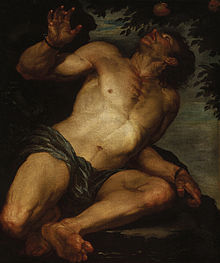Our website is made possible by displaying online advertisements to our visitors.
Please consider supporting us by disabling your ad blocker.
Tantalus
| Tantalus | |
|---|---|
Mythological King | |
 Tantalus by Gioacchino Assereto | |
| Other names | Atys |
| Abode | Lydia or Phrygia or Paphlagonia |
| Genealogy | |
| Parents | (1) Zeus and Pluto (2) Tmolus and Pluto |
| Consort | (i) Dione (ii) Taygete (iii) Eurythemista (iv) Euryanassa (v) Clytie (vi) Eupryto |
| Children | Pelops, Niobe, Broteas and Dascylus |
| Part of a series on the |
| Greek underworld |
|---|
| Residents |
| Geography |
| Prisoners |
| Visitors |
Tantalus (Ancient Greek: Τάνταλος Tántalos), also called Atys, was a Greek mythological figure, most famous for his punishment in Tartarus: for revealing many secrets of the gods and for trying to trick them into eating his son, he was made to stand in a pool of water beneath a fruit tree with low branches, with the fruit ever eluding his grasp, and the water always receding before he could take a drink.
Tantalus was the father of Pelops, Niobe, and Broteas. He was a son of Zeus[1] or Tmolus[2] and a woman named Pluto. Thus, like other heroes in Greek mythology such as Theseus (his great-great-grandson) and the Dioskouroi, he had one divine and one mortal parent.
The Greeks used the proverb "Tantalean punishment" (Ancient Greek: Ταντάλειοι τιμωρίαι: Tantáleioi timōríai) in reference to those who have good things but are not permitted to enjoy them.[3] His name and punishment are also the source of the English word tantalize, meaning to torment with the sight of something desired but out of reach; tease by arousing expectations that are repeatedly disappointed.[4]
- ^ Euripides, Orestes
- ^ "Tantalus". Encyclopedia Britannica.
- ^ Suida, s.v. tau.78
- ^ "Tantalize - Define Tantalize at Dictionary.com". dictionary.com. Retrieved 5 January 2023.
Previous Page Next Page


